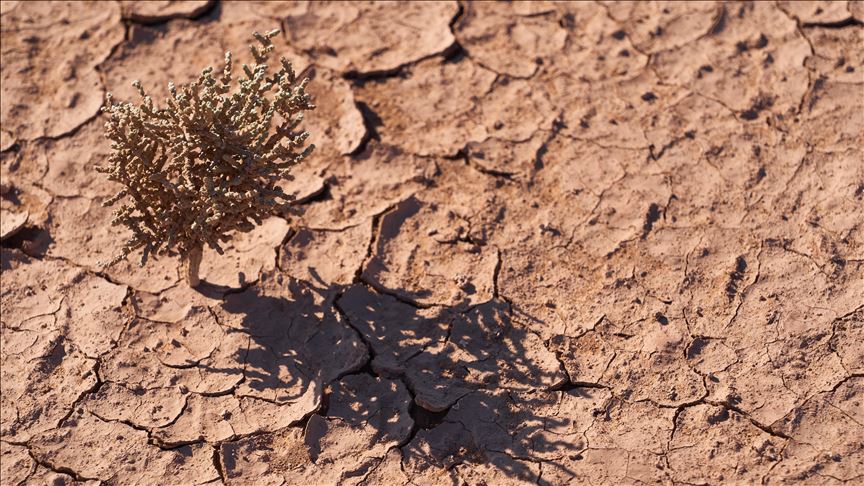'Soil degradation poses risk to food security'
Decline in soil quality causes fall in ecosystem services, loss of biodiversity that affects human welfare, says expert

ANKARA
Soil degradation from climate change will have its biggest impact on food security, according to an official with a nonprofit environmental group.
Regions which host one-third of the world population, 45% of total agriculture land and 50% of livestock are at risk of desertification. Land and soil degradation in these regions affect the lives of 1.5 billion people, Hikmet Ozturk, deputy general manager of the Turkish Foundation for Combating Soil Erosion, for Reforestation and the Protection of Natural Habitats (TEMA), told Anadolu Agency.
Speaking on the occasion of the World Soil Day, celebrated annually on Dec. 5, Ozturk stressed that while the amount of agricultural land per capita falls due to the rising population, soil in 33% of the land has degraded, and 12 million hectares (29.65 million acres) of agricultural land is destroyed each year.
"Soil degradation causes a drop in ecosystem services, reduces soil quality and also leads to a loss of biodiversity which directly affects human welfare," he said.
Erosion, salinization, pollution, loss of organic substance, excessive chemical and pesticide use, deforestation, urbanization and "brutal" mining activities are the reasons for soil degradation, he noted.
Mentioning the devastating effects of deforestation on soil, Ozturk said 45% of the world's forest presence has been turned into agricultural land, and if the degraded area is sloping land, it becomes useless due to erosion and is abandoned.
"As a result of the destruction of forests, the carbon/nitrogen balance of the soil is deteriorated, plant nutrients and soil microbiological activity drop," he added.
Climate effects
Touching on climate-related results on soil, he said climate change, which occurs due to a rise in greenhouse gases and is accelerated by the use of fossil fuels, is one of the main factors that affects soil degradation.
"More floods, droughts and rising sea levels due to global warming accelerate soil degradation," he said.
Noting that soil degradation also causes climate change as well as being affected by it, he said 35% of the raised carbon dioxide (CO2) in the atmosphere is the result of land destruction since 1850.
Due to unsustainable agriculture activities, permafrost areas thaw, leading to emissions of methane gas into the atmosphere that are 28 times more potent than CO2, he said.
"Everyone should individually protect the climate, nature, and soil to reduce consumption and avoid waste, because today the consumption of each individual is a burden on nature," he said.
Governments should give up fossil fuel-based energy policies, especially thermal coal-fired power plants that cause soil degradation and air pollution, the expert stressed, suggesting that countries should work in line with the 2030 Agenda of the UN Convention to Combat Desertification, which aims to halt and reverse land degradation.
"Practices to raise soil organic contents such as organic and organo-mineral fertilizers, we should encourage non-cultivated agriculture, agro-ecological agriculture as well as sustainable agriculture practices," he added.
Soil erosion in Turkey
Speaking on soil erosion and degradation in Turkey, which has accelerated with rising population and migration, he said urbanization wipes out approximately 11 hectares (27.18 acres) of soil every hour.
"Turkey's 26.4 million hectares [65.23 million acres] of agricultural land in 2001 declined to 23.2 million hectares [57.32 million acres] in 2018," said Ozturk.
If the country had produced wheat on the lost 3.2 million hectares (7.90 million acres) of land, it would have met the annual wheat need of 50 million people, according to 180 kilograms (396.8 pounds) per capita consumption annually, he stressed.
The expert added that annually 642 tons of soil erode in Turkey.
"Erosion control, afforestation and restoration continue with no slow-down. Damaged pasture areas should be improved rapidly, and erosion prevention projects in agricultural lands should be implemented and the producers carrying out this work should be supported," he suggested.
This year, the World Soil Day is marked with a call of "stop soil erosion, save our future," to raise awareness on the importance of sustaining healthy ecosystems and human wellbeing.
It addresses the rising challenges in soil management, and encourages governments, organizations, communities and individuals around the world to engage in proactively improving soil health.
Anadolu Agency website contains only a portion of the news stories offered to subscribers in the AA News Broadcasting System (HAS), and in summarized form. Please contact us for subscription options.






